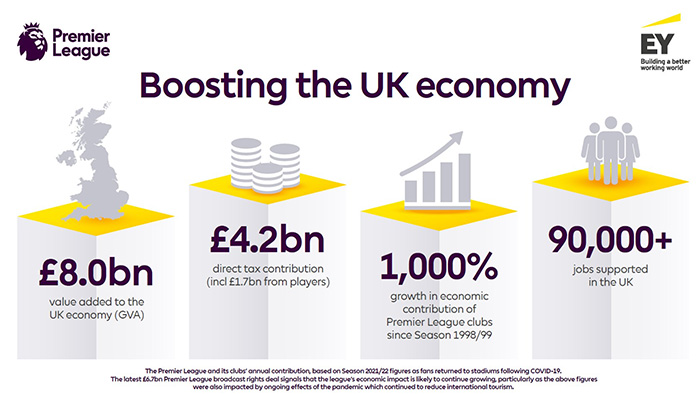EY Study Shows Premier League Football Contributed £8bn To The UK Economy In The 2021‑22 Season

The analysis reveals the Premier League and its clubs contributed £8bn to the UK economy during the 2021/22 season with its economic contribution likely to continue growing. The contribution has increased by £400 million based on the last EY assessment for the 2019/20 season.
The Premier League and its clubs generated a direct tax contribution of £4.2bn to the UK Exchequer, of which £1.7bn was accounted for by the League’s players and staff. They also supported more than 90,000 jobs across the country, demonstrating how its continued success generated widespread benefits for the economy and society.
EY’s study shows £5bn of the League’s economic footprint was located outside of London. In the North West, 33,000 jobs were supported, with an economic impact of £3.3bn driven by the Premier League in the region.
The figures are based on season 2021/22 as fans filled stadiums following two years of disruption due to COVID‑19, although the results were likely still impacted by the ongoing effects of the pandemic including a reduction in international tourism.
EY UK Chief Economist Peter Arnold said: “Despite the challenges of the pandemic, the Premier League maintains a substantial impact on the economy, and the announcement of the latest record‑breaking new domestic broadcast deals from 2025 to 2029 signals that its economic contribution is likely to continue growing.
“Its enduring global appeal and the active involvement of clubs in their local communities not only contribute significantly to the national economy, but also trigger wider societal benefits across the country.”
The Premier League has become the most popular and most‑watched football league globally thanks to the world‑class players and managers who consistently deliver exciting and competitive football in full stadiums with passionate fans.
Last week, the Premier League published its latest Annual Report for the Season 2022/23 which showed the competition drew a global TV audience of over 1.5 billion and saw average stadium crowds of more than 40,000 for the first time, with a record 98.7% record stadium utilisation across the League.
This on‑pitch success allowed the Premier League to maintain its longstanding investment into communities and football at all levels. The League supported 164 clubs to deliver community projects across the country, including in the Premier League, EFL, National League, and the women’s game. In addition, more than 5,650 grants have been provided to 1,083 lower league clubs to improve stadiums and facilities across 114 leagues since 2000.
Richard Masters, Premier League Chief Executive said: “These latest findings from EY show the continued and significant contribution the Premier League and our clubs make to the UK economy and we can be proud that the League’s positive impact is felt beyond what we see on the pitch.
“The popularity and success of the Premier League here and all around the world means we can continue investing in the League and provide world‑leading levels of support to clubs and communities across the entire game. Clubs are at the heart of their communities and this analysis shows the depth of that impact – not just in terms of direct financial contribution to the economy but also in supporting jobs and wider societal benefits.”
The results of the new study were welcomed by the Chancellor of the exchequer Jeremy Hunt: “The Premier League nets billions for our economy, supports thousands of jobs, invests heavily in the wider game and helps UK sport stand tall on the world stage.
“We will also continue to invest in the football pyramid across the country; recently kicking off a £93 million investment into grassroots football as part of a £400 million government investment into grassroots sports.”
Click the below image for a larger version.












































